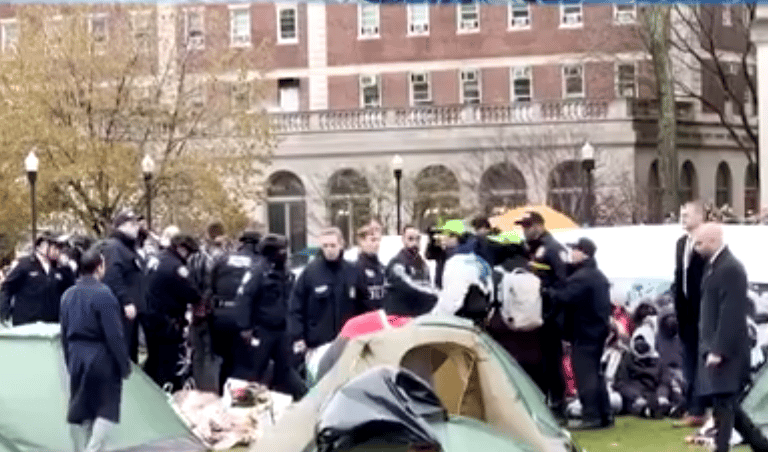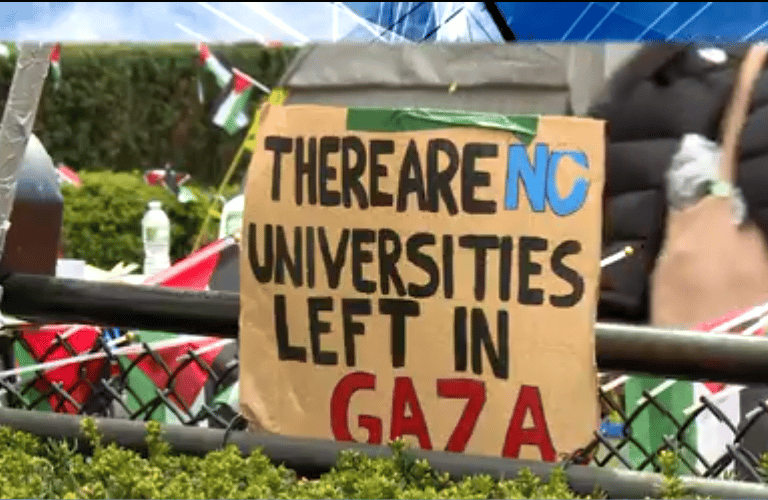Are colleges obstructing free speech for pro-Palestinian student activists?
ACTIVISM


Marc Lamont Hill discusses student activism for Palestine with Columbia University student organiser Maryam Alwan.
As Israel’s war on Gaza persists for over half a year, many university students in the United States have expressed solidarity with Palestinians.
Students at Columbia University set up a Gaza solidarity encampment and have called on the University to sever ties to Israel. Tensions escalated on April 18 after school officials called in police to arrest protesters. Dozens of students faced suspensions and were evicted from campus housing.
Since then, similar protests have sprung up from coast to coast – and they’ve been met with similar crackdowns in the name of safety. Is free speech being threatened at American universities?
This week on UpFront, Marc Lamont Hill talks to Maryam Alwan, an organiser with Columbia Students for Justice in Palestine, about what these students are trying to achieve despite attempts to limit free speech on campus.
Are American Colleges Suppressing Free Speech for Pro-Palestinian Activists?
In the wake of ongoing conflict in the Middle East, particularly the protracted Israeli-Palestinian conflict, the issue of free speech and activism on college campuses has come under scrutiny. Recent events at Columbia University highlight the challenges faced by pro-Palestinian student activists who are seeking to express solidarity with Palestinians and advocate for policy changes at their institutions.
At Columbia University, student organizers like Maryam Alwan, a key member of Columbia Students for Justice in Palestine, have been at the forefront of efforts to raise awareness about the situation in Gaza and call for institutional action. These efforts culminated in the establishment of a Gaza solidarity encampment on campus, coupled with demands for the university to sever ties with Israel.
However, tensions escalated dramatically on April 18 when university officials deployed police to arrest protesters and subsequently suspended dozens of students, even evicting some from campus housing. This heavy-handed response, ostensibly in the name of safety, raises troubling questions about the state of free speech and dissent within American academia.
Across the nation, similar scenes have unfolded as pro-Palestinian demonstrations have sprung up coast to coast, met in many cases with harsh crackdowns and punitive measures. The justification for these actions often revolves around maintaining order and safety on campus. But at what cost to the fundamental right of free expression?
To delve deeper into this issue, renowned commentator and academic Marc Lamont Hill engages in a candid discussion with Maryam Alwan, shedding light on the motivations and goals of student activists like her. Despite facing significant hurdles and attempts to curb their activism, these students remain resolute in their pursuit of justice for Palestine and the exercise of their constitutional rights.
The broader implications of this trend extend beyond the confines of university campuses. They touch on the very essence of democratic freedoms and the ability of young voices to challenge entrenched policies and narratives. The suppression of dissenting voices, irrespective of political orientation, undermines the core principles of academic discourse and civic engagement.
As the conversation unfolds, it becomes evident that the struggle for Palestinian rights on American campuses is not merely a localized issue. It mirrors broader societal debates about freedom of expression, the limits of dissent, and the responsibilities of academic institutions in fostering an inclusive environment for robust dialogue.
In an era marked by heightened polarization and global upheaval, the plight of pro-Palestinian student activists underscores the urgent need to protect and nurture free speech as a cornerstone of democratic society. Their experiences serve as a sobering reminder that true progress often emerges from the courageous efforts of those willing to challenge the status quo, even in the face of adversity.
Students at Columbia University set up a Gaza solidarity encampment and have called on the University to sever ties to Israel.
Tensions escalated on April 18 after school officials called in police to arrest protesters. Dozens of students faced suspensions and were evicted from campus housing. Since then, similar protests have sprung up from coast to coast – and they’ve been met with similar crackdowns in the name of safety. Is free speech being threatened at American universities


